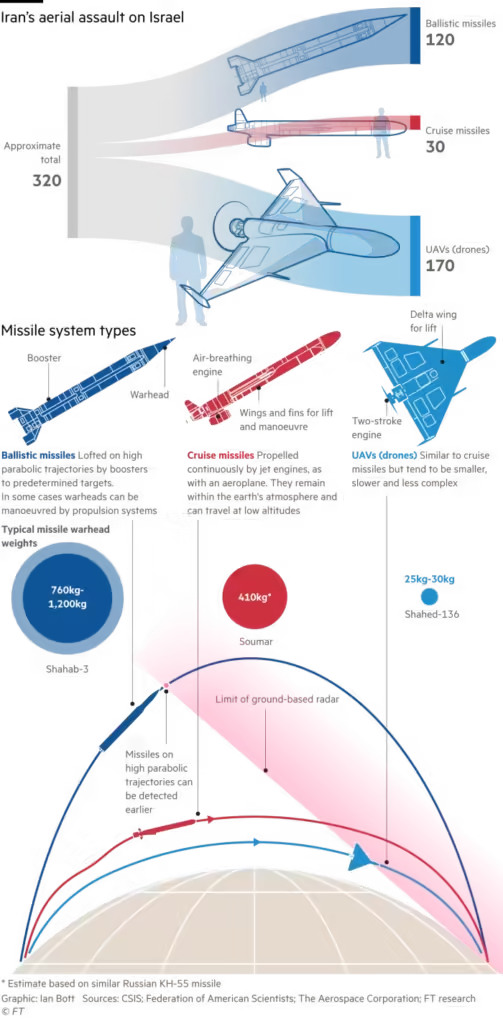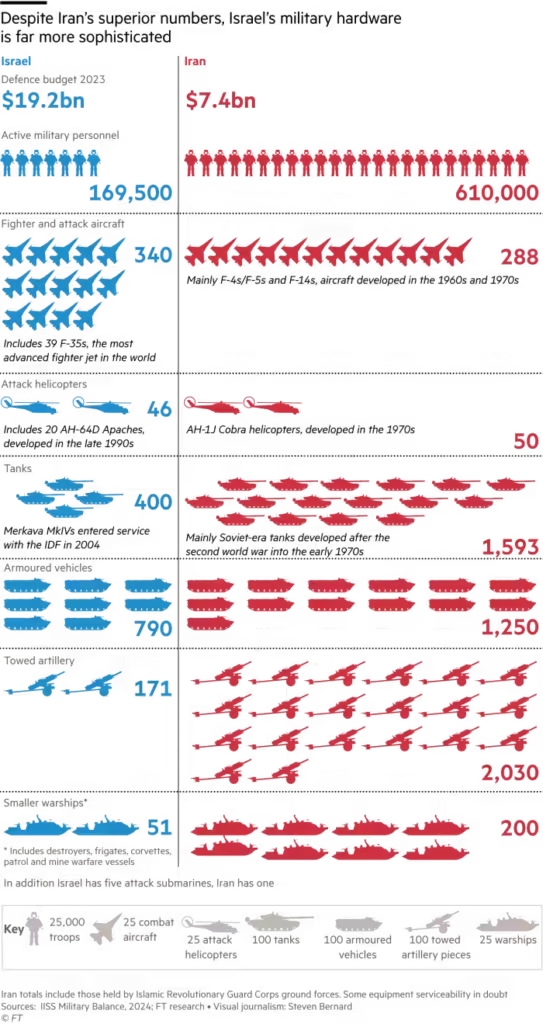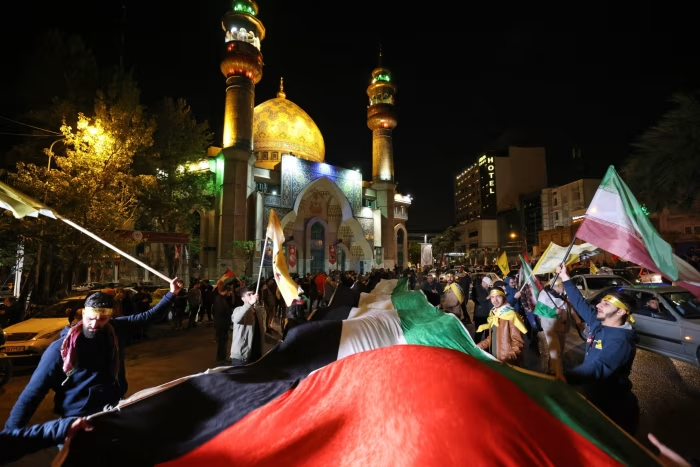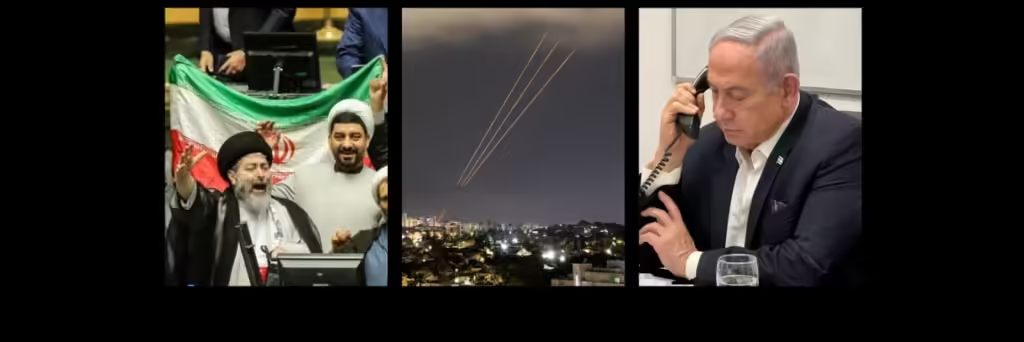14th April, 2024
Just after sunset on Saturday in Tehran, the commander of the Revolutionary Guards made a critical call to initiate “Operation True Promise” — an unprecedented aerial strike by the Islamic republic targeting the Jewish state.
Before Major General Hossein Salami listed the names of the senior Iranian military officials allegedly killed in an Israeli air strike on April 1 in Damascus, he recited a verse from the Koran.
“Fight them!” he declared. “Allah will chastise them at your hands, and He will lay them low and give you victory over them.”
Within moments, the assault commenced — a swarm of drones embarked on a nearly 2,000km journey, lasting hours, towards Israel, soon joined by missiles. This marked the first direct clash between the two dominant military forces in the Middle East, longstanding adversaries engaged in a prolonged shadow war characterized by Israeli targeted killings and Iran’s expansive Axis of Resistance, deploying its proxy militias and Iranian troops close to Israel’s borders.

Iran’s attack, quickly countered by Israel’s advanced aerial defenses, thrust the conflict into the forefront. In Tehran, some rushed to petrol stations and grocery stores, while others gathered in Palestine Square, adorned with Iranian flags. In Isfahan, cheers erupted as missiles soared over the grave of Mohammad Reza Zahedi, the general slain in an airstrike on Iran’s diplomatic compound in Damascus, an incident not publicly acknowledged by Israel.
Meanwhile, in Washington, US President Joe Biden abruptly ended his vacation on Saturday, returning to the White House amid concerns that this event might escalate into a full-scale war between Israel and Iran.
In Israel, where the assault had been anticipated, Prime Minister Benjamin Netanyahu’s aircraft, named the Wing of Zion, departed from Nevatim air base for safety as the missiles approached. Concurrently, numerous fighter jets and defense systems, including those from Britain, Jordan, and the United States, were mobilized to repel the attack.
At 8pm local time, residents witnessed Prime Minister Netanyahu’s convoy hastily departing from the Jerusalem residence of a billionaire acquaintance, rumored to be equipped with an anti-missile shelter, where he and his wife had spent the Sabbath.
What ensued was a spectacle on social media, likely aligned with Iran’s intentions. Throughout Iraq, Jordan, and Lebanon, a grim procession of drones illuminated the night sky, drawing applause from some observers. Even in Beirut, nightclub revelers momentarily halted their dancing to witness a projectile streaking overhead.
According to Holly Dagres, a senior fellow at the Atlantic Council, Tehran aimed to showcase its strength to a global audience. “In the eyes of the clerical establishment, this mission was a success because they were able to strike Israel directly from Iranian territory, highlighting their newfound dominance in the skies despite outdated fighter jets from the Shah era and perceived air inferiority.”
As the drones embarked on their lengthy journey, Israelis took shelter at home, prepared for potential threats, their resilience tinged with a touch of dark humor. “First direct flights from Iran to Israel since 1979,” quipped one Israeli, alluding to the Iranian Revolution.
However, beneath the surface jest, there lingered a deep-seated existential anxiety that Prime Minister Netanyahu has capitalized on throughout his political career: the looming specter of an inevitable full-scale war with Iran.
Despite Israel emerging largely unscathed from the Iranian onslaught—a child sustained injuries from shrapnel, minimal damage occurred to a military base, and only a few missiles breached Israeli airspace—the response from Netanyahu will determine whether this remains a singular, deadly exchange or escalates into the long-anticipated conflict he has often forewarned about.
Following Major General Salami’s directives in Tehran and Israel’s successful interception of 99 percent of the assault, Iran declared its mission accomplished: “the operation is over.”
At that time, Netanyahu is said to have told Biden over the phone that Israel’s valiant defense was sufficient to win the war and that the US would not participate in any counterattack.
According to a senior US official, “the president told the prime minister that Israel really came out far ahead in this exchange.” Israel overthrew the IRGC’s leadership in the Levant, and when Iran attempted to retaliate, Israel had amply proven its military might.
For years, Israel has had to defend itself against rocket attacks from Hamas and Hizbollah using its renowned Iron Dome. Its interceptors are already a common sight, chasing threats low over the Tel Aviv cityscape.
However, since 1991, when Saddam Hussein fired scores of Scud missiles at Tel Aviv and Haifa during Iraq’s conflict with Israel’s closest friend, the US, this was the first time the Jewish state had been attacked by another nation.
George H.W. Bush convinced Prime Minister Yitzhak Shamir not to respond back then. Given the magnitude of Iran’s attack this time around—Iran fired more ballistic missiles at Israel in an hour this weekend than Iraq did over weeks of fighting—Bibi may be less amenable to that argument.
Minutes away from Israeli territory, at least one hundred ballistic missiles were tearing across the skies as Biden observed from the Situation Room at the White House.
However, all things considered, Iran might have slightly strengthened Biden’s case. Tehran reduced the likelihood of mass casualties by telegraphing the attack for two weeks and mostly using slow-moving drones that Israel’s air defenses could readily identify and destroy.

These drones have proven to be easily destroyed; the Shahed-136, for example, is similar to the drones that Russia has unleashed into Ukraine. Even Ukraine’s pitiful air defenses have done so. Concurrently, an Israeli official stated that the army of drones was meant to track the locations and movements of Israel’s defense assets and to provoke reactions from the nation.
“They learned a lot about us, and we learned a little about them,” the official said. “It served as education.”
Israel had already warned the world and placed its most sophisticated, multibillion-dollar missile defenses on high alert, even though Iran’s rockets were more difficult to deflect. After the Arrow system destroyed most of the cruise and ballistic missiles, Israel’s partners neutralized the remaining ones.
“The Israelis have an extremely potent, multi-layered defense system against missiles, which the Iranians have taken into account,” stated Sima Shine, a former Mossad intelligence officer who focused on Iran. “And they most likely considered the possibility that there wouldn’t be many casualties.”
According to Shine, the attack was comparable to the one Iran carried out following the killing of IRGC leader Qassem Soleimani in 2020, which was carried out on US President Donald Trump’s orders. Iran gave advance information of the attack on US forces in Iraq both then and now, allowing them to take defensive actions that prevented any losses from the widely publicized incident.

Demonstrators wave Iranian and Palestinian flags as they gather at Palestine Square in Tehran on April 14 after the assault against Israel had been launched © Atta Kenare/AFP/Getty Images
From Iran’s perspective, it was a demonstration of our capabilities. Our drones and weapons are all different. We’re capable of it. We would rather not turn it into a battle,” Shine remarked. “There were no casualties, so we can sit here and talk about waiting and seeing and thinking without taking revenge.”
Indeed, Israel reverted to a regular, although martial, cadence almost quickly after the attack ended. Residents were informed that they were no longer need to seek shelter and that all nationwide prohibitions on public gatherings would be removed by Monday night.
But if not Iran, the nation was still at war—at least with Hamas. And in the north, in reprisal for rocket attacks earlier that evening, Israeli airplanes hit Hizbollah targets, just as they had nearly every day for the previous six months.
“We managed to intercept. [The attack] was halted by us. Netanyahu said on X, “Together we will prevail. This onslaught may be finished, but Israel’s fight is far from over.

